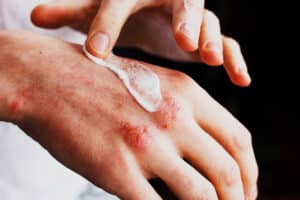Debunking Eczema Myths

Eczema is also known as atopic dermatitis. It’s a chronic and inflammatory skin condition characterized by dry, itchy, red, and sometimes scaly patches of skin. It’s a common skin condition that can affect people of all ages, from infants to adults. Eczema is believed to result from a combination of genetic and environmental factors, including immune system dysfunction and a compromised skin barrier. There are many “facts” floating around about this condition. Keep reading to learn more about some common misconceptions about eczema.
Myth 1: Eczema Is Contagious
Eczema isn’t contagious. It’s a chronic skin condition that is often genetically predisposed and related to immune system dysfunction. You can’t “catch” eczema from someone else.
Myth 2: Eczema Is Just a Skin Rash
Eczema is more than just a simple rash. It’s a complex condition that involves inflammation and dysfunction. This can lead to redness, itching, and discomfort, but it also makes the skin more susceptible to infections and other complications.
Myth 3: Eczema Is Always Caused by Allergies
While allergies can worsen eczema symptoms in some individuals, eczema itself is not always caused by allergies. Genetics, immune system dysfunction, and environmental factors can all play a role in the development of eczema.
Myth 4: Eczema Is Just a Cosmetic Issue
Eczema can have a significant impact on a person’s quality of life. The intense itching and discomfort can lead to sleep disturbances, anxiety, and even depression. In severe cases, the skin can become cracked and prone to infections, which can further affect overall health.
Myth 5: Eczema Can Be Cured
There is no known cure for eczema. However, there are various treatments available that can help manage and control symptoms. These treatments aim to reduce inflammation, relieve itching, and improve the skin’s barrier function.
Myth 6: Eczema Will Always Stay the Same
Eczema symptoms can fluctuate over time. Some people may experience periods of remission where their skin is clear, while others may have flare-ups with more severe symptoms. Lifestyle changes, triggers, and medical interventions can all influence the course of the condition.
Schedule a Consultation
Remember that eczema is a medical condition, and if you suspect you have it or you want to discuss different treatment options, contact a dermatologist’s office, such as Dermatology Consultants of Short Hills in Short Hills, NJ, to schedule an appointment. Call at 973-232-6245.




